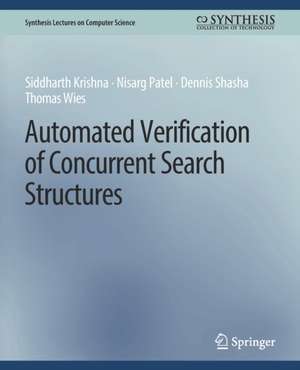Automated Verification of Concurrent Search Structures: Synthesis Lectures on Computer Science
Autor Siddharth Krishna, Nisarg Patel, Dennis Shasha, Thomas Wiesen Limba Engleză Paperback – iun 2021
Din seria Synthesis Lectures on Computer Science
- 15%
 Preț: 523.07 lei
Preț: 523.07 lei - 20%
 Preț: 275.13 lei
Preț: 275.13 lei - 20%
 Preț: 280.92 lei
Preț: 280.92 lei - 20%
 Preț: 280.08 lei
Preț: 280.08 lei - 20%
 Preț: 280.73 lei
Preț: 280.73 lei - 20%
 Preț: 275.31 lei
Preț: 275.31 lei -
 Preț: 421.72 lei
Preț: 421.72 lei -
 Preț: 416.54 lei
Preț: 416.54 lei -
 Preț: 454.92 lei
Preț: 454.92 lei -
 Preț: 487.57 lei
Preț: 487.57 lei -
 Preț: 385.33 lei
Preț: 385.33 lei -
 Preț: 141.31 lei
Preț: 141.31 lei -
 Preț: 192.05 lei
Preț: 192.05 lei - 20%
 Preț: 433.28 lei
Preț: 433.28 lei - 19%
 Preț: 455.54 lei
Preț: 455.54 lei - 19%
 Preț: 449.85 lei
Preț: 449.85 lei - 20%
 Preț: 262.82 lei
Preț: 262.82 lei - 20%
 Preț: 250.95 lei
Preț: 250.95 lei - 20%
 Preț: 246.51 lei
Preț: 246.51 lei
Preț: 418.07 lei
Nou
Puncte Express: 627
Preț estimativ în valută:
79.100€ • 83.75$ • 66.19£
79.100€ • 83.75$ • 66.19£
Carte tipărită la comandă
Livrare economică 07-21 aprilie
Preluare comenzi: 021 569.72.76
Specificații
ISBN-13: 9783031006784
ISBN-10: 303100678X
Pagini: 182
Ilustrații: X, 182 p.
Dimensiuni: 191 x 235 mm
Greutate: 0.34 kg
Editura: Springer International Publishing
Colecția Springer
Seria Synthesis Lectures on Computer Science
Locul publicării:Cham, Switzerland
ISBN-10: 303100678X
Pagini: 182
Ilustrații: X, 182 p.
Dimensiuni: 191 x 235 mm
Greutate: 0.34 kg
Editura: Springer International Publishing
Colecția Springer
Seria Synthesis Lectures on Computer Science
Locul publicării:Cham, Switzerland
Cuprins
Acknowledgments.- Introduction.- Preliminaries.- Separation Logic.- Ghost State.- The Keyset Resource Algebra.- The Edgeset Framework for Single-Copy Structures.- The Flow Framework.- Verifying Single-Copy Concurrent Search Structures.- Verifying Multicopy Structures.- The Edgeset Framework for Multicopy Structures.- Reasoning about Non-Static and Non-Local Linearization Points.- Verifying the LSM DAG Template.- Proof Mechanization and Automation.- Related Work, Future Work, and Conclusion.- Bibliography.- Authors' Biographies.
Notă biografică
Siddharth Krishna is a post-doctoral researcher at Microsoft Research Cambridge, UK. He completed his Ph.D. in logic and verification at New York University, where he had the good fortune to work with Nisarg, Dennis, and Thomas. He now works on parallel and distributed algorithms for large-scale machine learning workloads. When he is not pleading with computers to do his bidding, he likes to watch comedy panel/news shows and play ultimate frisbee.
Nisarg Patel is a Ph.D. student at New York University’s Department of Computer Science, where he works with Siddharth, Dennis, and Thomas on automated verification of concurrent programs. His academic interests also include synthesis of controller programs for robots. Outside of computer science, he loves playing football and reading about history and politics.
Dennis Shasha is a Julius Silver Professor of computer science at the Courant Institute of New York University and an Associate Director of NYU Wireless. In addition tohis long fascination with concurrent algorithms, he works on meta-algorithms for machine learning to achieve guaranteed correctness rates; with biologists on pattern discovery for network inference; with physicists and financial people on algorithms for time series; on database tuning; and tree and graph matching. Because he likes to type, he has written six books of puzzles about a mathematical detective named Dr. Ecco, a biography about great computer scientists, and a book about the future of computing. He has also written technical books about database tuning, biological pattern recognition, time series, DNA computing, resampling statistics, and causal inference in molecular networks. He has written the puzzle column for various publications including Scientific American, Dr. Dobb’s Journal, and currently the Communications of the ACM. He is a fellow of the ACM and an INRIA International Chair.
Thomas Wies is an Associate Professor in computer science at the Courant Institute of New York University and a member of the Analysis of Computer Systems Group. His research interests are in programming languages and formal methods with a focus on program analysis and verification, automated deduction, and correctness of concurrent software. He is the recipient of an NSF CAREER Award and has won multiple best paper awards. His fascination with concurrent tree traversals extends to his spare time: he enjoys hikes in the woods.
